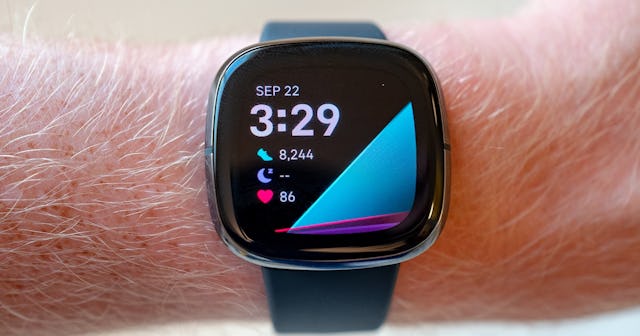Fitbit Data Suggests COVID Survivors Have Elevated Heart Rate For Months Afterwards

Fitbit data shows that people with long COVID-19 have elevated heart rates for months after initial symptoms subside
COVID-19 naysayers will constantly tell you that getting coronavirus is “just like a bad flu,” but more data continues to come out proving it’s way worse than that, and that “long COVID,” as it’s sometimes called, is a hell of a thing. New data from Fitbit (yes, the watch that reminds you to go outside and get those steps), shows that in people who contracted COVID-19, their heart rates were elevated for months after testing positive for the virus.
The New York Times reports that people recovering from “long COVID” have “reported a wide range of lasting health effects, including fatigue, ‘brain fog,’ shortness of breath, headache, depression, heart palpitations, and chest pain.” Now, this new Fitbit data suggests that an unnaturally elevated heart rate lasting for months after illness subsides can be added to the mysterious and ongoing list of “long COVID” issues.
Data from a new study that monitored the Fitbit data of hundreds of people who tested positive for COVID-19 found that they had an elevated heart rate for, on average, three months after their symptoms began. 14% of people continued to have an elevated heart rate for four and a half months.
The study compared the COVID-19 patients to others dealing with separate respiratory illnesses and found that only the COVID-positive bunch faced an extreme change in heart rate. The COVID negative individuals, although dealing with varying respiratory issues, found their heart rates to return to normal after about four days.
“There was a much larger change in resting heart rate for individuals who had Covid compared to other viral infections,” Dr. Jennifer Radin, an epidemiologist at Scripps who is leading the trial, told The New York Times. “We also have a much more drastic change in steps and sleep.”
So what does this all mean?
Researchers think that the prolonged heart rate elevation means that COVID-19 disrupts the autonomic nervous system, which regulates basic physiological processes.
“Lots of people who get COVID-19 end up getting autonomic dysfunction and a kind of ongoing inflammation, and this may adversely affect their body’s ability to regulate their pulse,” Dr. Radin continued.
People suffering from long COVID-19 are probably asking, okay… and? Even the researchers admit that more needs to be studied regarding the lingering effects of COVID-19 and what can be done to help COVID-19 survivors.
“We want to kind of do a better job of collecting long-term symptoms so we can compare the physiological changes that we’re seeing with symptoms that participants are actually experiencing,” Radin said. “So this is really a preliminary study that opens up many other studies down the road.”